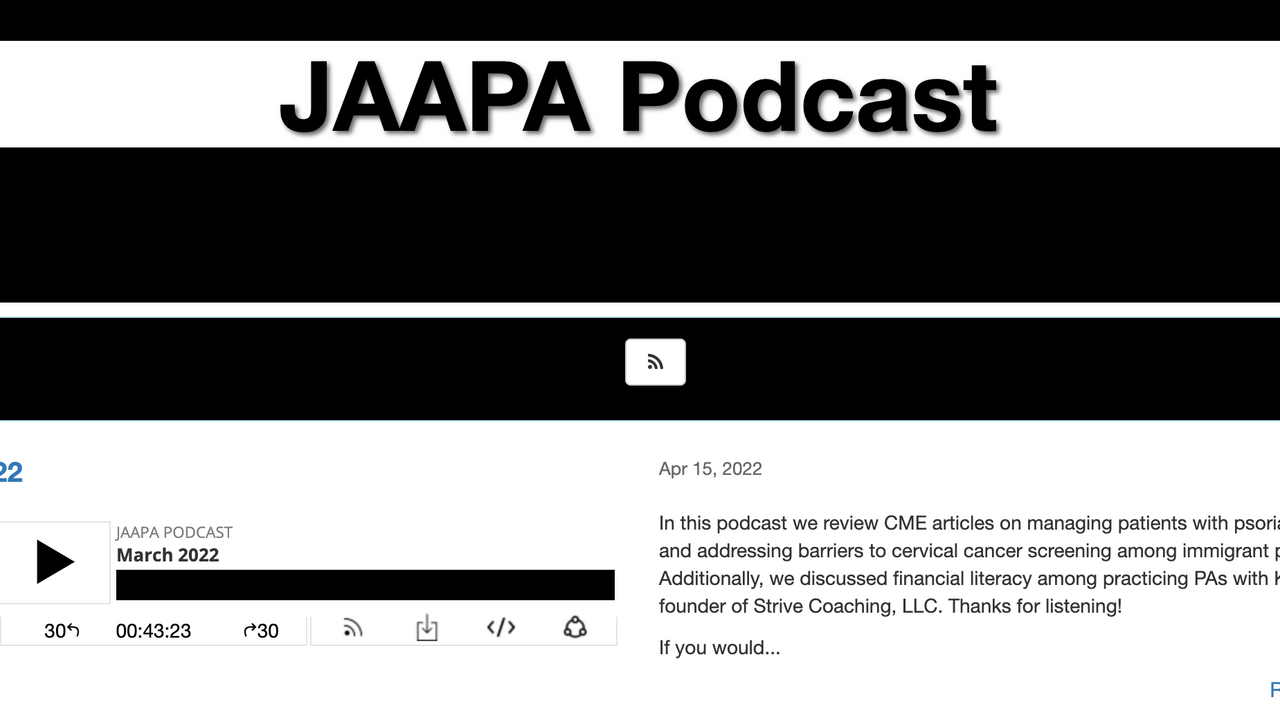Binge read all things wealth building, debt reduction, & lifestyle.
How I Became A Millionaire At 31 As A PA-C

I became a millionaire at 31.
I didn't sell a business, get a six figure inheritance, or rob a bank. Rather, my husband and I accomplished this feat by being incredibly purposeful and deliberate with our finances over a period of many years.
When I graduated from physician assistant school at the age of 25, I was saddled with an overwhelming student loan debt of $161,000. My husband and I had little savings to speak of, no real knowledge about investing, and the added burden of a mortgage to contend with. The future looked daunting, and at times it felt like we were facing an insurmountable challenge.
At the time, I thought my primary money problem was my student loan debt. (Turns out, it wasn't. More on that later.) Nevertheless, I remained determined to tackle my student loans head-on and focused all my energy on paying them off as rapidly as possible, hoping to achieve financial stability sooner rather than later.
I worked full time as a PA-C, and then...
Is Your Estate In Order?

Do you have a spouse, dependent(s), or substantial assets?
If you fall into any of those categories, read on...
A basic estate plan is something almost all of us should be thinking about. This starts with a determination of how your assets should be addressed upon your death. This can be accomplished through a will or a trust.
A will is a legal document designating what should become of your assets after your death. It should also designate a guardian for any dependents. A will can request an executor to create a trust after your death to hold assets for a minor (I would have an attorney set this up). A minor should never be directly listed as the beneficiary of a life insurance policy.
If you die with a will, your assets will go through the process of probate. Probate is the process of the legal system reviewing your will and the distribution of assets. This process takes time, involves lawyers, and costs money. Of note, 401(k) plans and IRAs...
JAAPA Podcast

If you're a PA or future PA, this is a must listen.
Some new data was recently published on the lifetime financial modeling of an average family practice PA. It's really unique for this type of information to come out specific to the PA profession, as most similar projections have been done based on the physician model. I was a guest on the JAAPA Podcast discussing this exciting publication.
Does the model apply to you? How does your cost of living affect the projections? What about student loan debt, and funding retirement?
Tune in to the podcast to find out more!
Paying for the Holidays

This post contains affiliate links. If you make a purchase, I will be compensated at no additional cost to you. For my full disclosure, click here.
The holidays are a wonderful season full of joy and family, and a WHOLE lot of extra expenses. If you're stressed about paying for all the extras this season, check out these suggestions.
- Make a list of people you plan to buy gifts for, and set a specific price point per person.
Having an organized game plan before you go shopping helps you stay on track while looking for gifts, and helps you determine a total price point for your budget. DO NOT plan to spend more on gifts than you can afford to spend - racking up credit card debt to buy gifts isn't worth it.
- If you realize you can't swing buying gifts this year, make something.
You may look at your budget and your list of people you would like to give a gift to, and realize there is no way to buy traditional gifts and stay on budget. Make something! The...
3 Ways You're Crushing Your Finances

This post contains affiliate links. If you make a purchase, I will be compensated at no additional cost to you. For my full disclosure, click here.
Let's chat about a few of the most common money mistakes out there, and how avoiding them can dramatically improve your financial future.
1. Not taking advantage of free money
- Depending on which study you look at, somewhere between 1 in 4 and 1 in 5 Americans are not taking full advantage of employer matches at work. This is FREE MONEY. You should be contributing at least enough to your employer retirement plan to obtain the free match, no matter what. Don't forget HSA matches as well! HSAs offer triple tax savings as is, so the potential for free money being added to your account just sweetens the deal. Employer matches (if they match dollar for dollar), are literally an automatic 100% return on your investment REGARDLESS of the market. Compound that money over decades, and you have completely changed the...
Mindset Matters

This post may contain affiliate links. If you make a purchase, I will be compensated at no additional cost to you. For my full disclosure, click here.
Mindset is a buzz word these days, but for good reason. Your mindset matters. This is true in all aspects of life, and money is no exception.
YOUR THOUGHTS AND FEELINGS ABOUT MONEY WILL FUNDAMENTALLY CHANGE YOUR FINANCIAL FUTURE.
What things can you do to "check in" on your money mindset?
1. EVALUATE HOW YOU VIEW "RICH PEOPLE"
- The narrow viewpoint that "rich people" are in some way "other" or fundamentally different than you is a lie. Most of us take it a step further though, and develop a social box that we put wealthy people in and then make unfounded assumptions based upon our social construct. If you find yourself assuming that wealthy people inherited their wealth, are greedy, or are lazy... you need to do some fact checking. Multiple studies have found that less than 20% of millionaires inherited their wealth (see ...
How I Started My Business

This post may contain affiliate links. If you make a purchase, I may be compensated at no additional cost to you. For my full disclosure, click here.
If you have a desire to start your own business, the first thing I would say is JUST DO IT. The process can be scary, but it can also be incredibly rewarding. Even if it doesn't become your full time job, it can help you diversify your income.
Here is a brief overview of the basic steps of the process:
1. Choose a name for your business
- Make sure the name isn't already registered as another business in your state, or is trademarked. This can be done with a simple internet search. I would also check that the domain name is available at this time if you are dead set on one for your website.
2. Legally form the company
- I formed an LLC in Indiana. Which type of company to form is beyond the scope of this post (lots of tax implications), but consider reading a book like LLC for Dummies. I...
Cutting The Grocery Bill

This post contains affiliate links. If you make a purchase, I may be compensated at no additional cost to you. For my full disclosure, click here.
Groceries are a HUGE money suck for families. Let's be honest, you go to the grocery store in a rush and probably hungry. You start adding things to your cart. Next thing you know, you're checking out and wondering why your weekly groceries are somehow hundreds of dollars.
Finding ways to reduce your grocery expenses can free up a LOT of room in your budget, which can then be channeled into debt payoff or investing.
Let's break down some ideas:
1. MEAL PLANNING
- Honestly this is fundamental. If you don't know what you're going to eat, you don't know what you need to buy. If you're not one to want to sit down and craft a meal plan, check out $5 meal plan. It's a service that will provide you meal plans for $5/month and then auto create a grocery list based on the plan. I've used it and felt it saved me a lot of...
How To Save For A Major Purchase
This post contains affiliate links. If you make a purchase, I will be compensated at no additional cost to you. For my full disclosure, click here.
How do you prep financially for a major purchase - like a car, pool, trip-of-a-lifetime, etc? We are in the midst of a major kitchen and dining room remodel, which is our big purchase this year, so this is fresh on my mind.
ADVANCE PLANNING IS KEY.
The only way to pay for ANYTHING is in cash. Utilizing a loan, payment plan, or credit card is digging yourself into a hole you will have to crawl out of later, with interest. The only way to pay cash for a major expense is to plan WELL in advance.
HERE IS HOW WE PAID FOR OUR REMODEL IN CASH:
1. DETERMINE THE TOTAL COST OF YOUR PURCHASE
- For us, that meant getting approximate quotes on the various aspects of the remodel well in advance. If you're buying a car, determine the average price of the car you want. Be warned though, the process of looking before you buy can get tempting....
Your Emergency Fund

One of the things that this pandemic has shown us with certainty is that nothing is certain. People have lost jobs, businesses, commissions, etc with little to no notice. You may have not been financially prepared this time around, but you can use this as a learning experience and motivation to be better prepared in the future.
An emergency fund is the key to financial security in an uncertain world.
This is one of those paramount "must haves" to protect you and your family. Determining how much you need and where to put it is fairly simple. The hard part is accumulating the money, and then having the self discipline not to touch it unless there is a TRUE emergency.
LET'S TALK THROUGH IT...
1. HOW MUCH DO YOU NEED?
- Take a look at your budget and calculate your monthly expenses. This includes all bills and essentials like food and household items. I wouldn't include entertainment or shopping "extras" in this. Take this amount times 6 (some say 3, but I like the extra...



